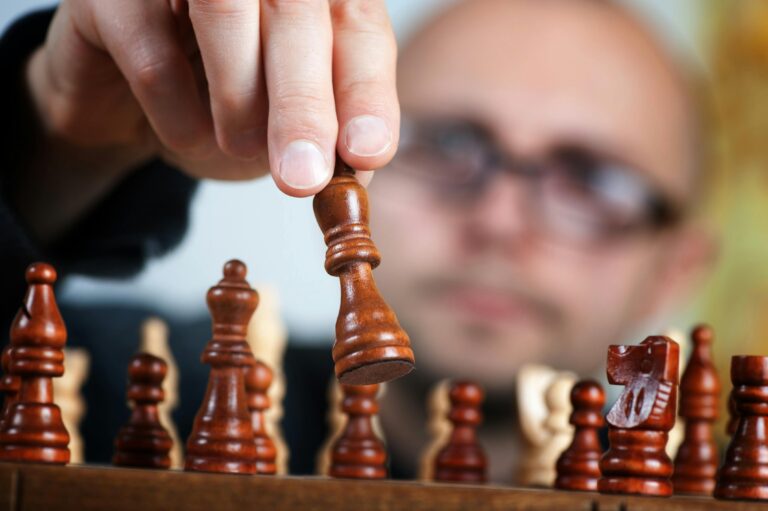
Introduction
Chess is a game of strategy, calculation, and intuition. It has captivated minds for centuries and continues to challenge players of all skill levels. Despite its seemingly simple rules, chess is a game where even the smallest deadly chess mistakes can have catastrophic consequences. Whether you’re a beginner or an experienced player, avoiding common mistakes is crucial to improving your game and achieving success. This article will explore some of the most deadly chess mistakes, explaining why they occur and how to avoid them.
1. Neglecting King Safety
One of the most critical errors in chess is neglecting the safety of your king. Failing to castle early, leaving open lines of attack, or exposing your king to checks can lead to quick defeats.
- Why It Happens: Some players get so caught up in their attack or other aspects of the game that they forget to safeguard their king. Others delay casting, thinking they can always do it later.
- How to Avoid It: Castle early—typically by move 10—to secure your king. Be mindful of potential threats from your opponent’s pieces, especially when they are well-coordinated.
2. Ignoring Development
Development is a fundamental aspect of deadly chess mistakes strategy. Players who neglect to develop their pieces often find themselves with limited options and vulnerable positions.
- Why It Happens: Newer players may focus on individual pieces or short-term tactics, overlooking the importance of having all their pieces active and contributing to the game.
- How to Avoid It: Develop your knights and bishops early, aiming to control the center of the board. Try to connect your rooks by clearing the back rank of pieces like queens and bishops.
3. Overlooking Opponent’s Threats
Chess is a game of dual threats—your own and those of your opponent. A common mistake is failing to recognize the dangers posed by your opponent’s pieces.
- Why It Happens: Players may be too focused on their own plans or strategies, neglecting to see the threats their opponents are building.
- How to Avoid It: Before making a move, ask yourself, “What is my opponent threatening?” Consider all possible responses to each move to ensure you’re not walking into a trap or an attack.
4. Poor Pawn Structure
Pawns are the foundation of a solid chess position. Poor pawn structure can lead to weaknesses that opponents can exploit.
- Why It Happens: Inexperienced players might not realize the long-term impact of pawn moves, leading to isolated, doubled, or backward pawns.
- How to Avoid It: Be strategic with pawn moves. Avoid creating weaknesses in your pawn structure unless there’s a good reason. Control the center and keep your pawns connected to each other for better defense.
5. Unnecessary Sacrifices
Sacrificing material for an advantage is a common tactic in chess. However, unnecessary sacrifices can quickly turn a winning position into a losing one.
- Why It Happens: Some players overestimate their attacking chances or underestimate their opponent’s defenses, leading them to sacrifice pieces without a clear plan.
- How to Avoid It: Before sacrificing material, ensure that it leads to a significant advantage, such as a checkmate, winning back the material, or a decisive positional advantage. Consider alternative moves and assess the risks involved.
6. Failing to Calculate Variations
Calculation is at the heart of deadly chess mistakes. Failing to calculate variations or overlooking potential responses can result in devastating blunders.
- Why It Happens: Players might rush their moves or rely too heavily on intuition without properly analyzing the consequences.
- How to Avoid It: Take your time to calculate variations, especially in critical positions. Consider different move sequences and evaluate the outcomes to determine the best course of action.
7. Ignoring Endgame Fundamentals
The endgame is where many games are decided, yet it’s an area where even experienced players make mistakes. Ignoring endgame fundamentals can lead to missed opportunities or catastrophic losses.
- Why It Happens: Players might focus too much on the opening and middle games, neglecting to study endgame concepts and techniques.
- How to Avoid It: Learn basic endgame principles, such as king and pawn endgames, rook endgames, and minor piece endgames. Practice common endgame scenarios to become familiar with key ideas and techniques.
Conclusion
Chess is a challenging game that requires careful planning, calculation, and awareness. By understanding and avoiding these deadly chess mistakes, you can improve your play and increase your chances of success. Remember to focus on king safety, piece development, and recognizing opponent threats. Maintain a solid pawn structure, avoid unnecessary sacrifices, and always calculate variations. Finally, don’t neglect the endgame—it’s where many games are won or lost. With practice and a commitment to learning, you can elevate your deadly chess mistakes game to new heights.